High Profile
Right is might
Interview by Huw Spanner
Khalid Mish’al is widely regarded as the most senior figure
in Hamas, the Islamist resistance movement that two years ago won a
landslide victory in the Palestinian general election. Third
Way found him at home in Damascus.
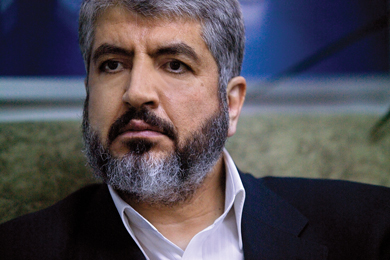
We have a saying in English, ‘The child is father to the
man.’ Could you tell us a little about your childhood, and
especially the people and the experiences that, looking back, you
feel have made you the man you are today?
Like any Palestinian child, I was influenced by a great many
factors, at the level of the immediate family, the village or the
[refugee] camp, and the society and the conflict it has witnessed
for long decades. I was influenced deeply by my mother, a devout
woman who cares very much for her children, and a close family,
praise God. My father was a member of the Palestinian resistance in
the Thirties and Forties. I learnt the spirit of resistance and
struggle from him, and I learnt integrity from him and my mother
and my family in general.
The village of Silwad, where I was born, was conservative and
devout. There, I loved life. I loved nature – I loved the land, the
trees, the seasons. This made my commitment to life at the same
time profound and simple, and this simple life fostered in me the
values of honesty, manliness, courage, straightforwardness and a
concern for other people’s welfare.
In my childhood, without question, the Arab-Israeli conflict
started to have an impact on our experience of life early on. The
media then were limited, especially in the village, but
nevertheless we grew up with the conflict. The event that changed
the course of my life was the [Six-Day War] in 1967. It forced me
to leave my homeland and migrate to Jordan and then to Kuwait. It
was also a turning point in my thinking – despite my young age –
about the conflict and the Palestinian cause.
Before 1967, I was like any child living in a normal – or almost
normal – society. My studies were the main interest in my life,
especially as, praise God, I excelled at them – I was top in my
school. But after 1967 I became a different person. The suffering
of our people, half of whom now lived under occupation and half in
a diaspora, became the main focus of my life. I had witnessed the
Palestinian tragedy myself. I had seen the effect of the war on the
part of the West Bank where I lived. I had seen the defeat of the
Arab armies. I had seen tens of thousands of my people leaving
their homeland and travelling east across the [Allenby] Bridge.
Subsequently, I shared the Palestinian experience of exile.
So, these events left a lasting impression on my life. And they
caused me to grow up quickly, like all of my people, both inside
and outside Palestine.
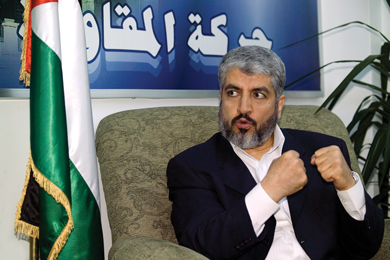
Your brothers and sisters had the same experience. What
has become of them?
I have five brothers and five sisters. Today, they are all
married and living in various countries, Arab and non-Arab. Their
homelessness is typical of Palestinian life.
Would people who knew you as a boy be surprised to see
what you have become – a leader of your people, and a leader of the
resistance?
I don’t know of anyone who finds it surprising. I stood out
among my peers academically, socially and at sport. In all those
areas, praise God, I was distinguished at an early age. And when I
became a committed Muslim, when I was 14 years old, in that, too, I
stood out among my peers. We formed a religious society in my
secondary school in Kuwait and I was its head. And when we started
thinking about how our people could resist the occupation, I took a
lead in that.
Some people will say that the Arabs started the Six-Day
War and therefore what happened to the Palestinians is their fault.
Is there another point of view?
The way Israel waged the war suggests that they had a hidden
agenda and already wanted, and had planned, to expand.
Why did you choose to study physics at
university?
I have always been interested in many different things, which
made it hard for me to choose what to study. I loved science, and
especially physics, but I also loved studying literature and
history, Arabic, poetry – and my interest in Islamic studies had
also been growing. But I decided to specialise in physics. I wanted
to study it more deeply – I saw myself becoming a physicist – but
in the end I found that there are more urgent priorities in the
cause I am fighting for.
You have lived in Jordan, Kuwait, Qatar and now Syria.
Many people in the West would say: There are so many Arab countries
where Palestinians can live, they don’t need a homeland. Can you
explain why it is so important to you to go back to that little
patch of country?
Let me give you some images that express how I feel about my
land. Although I lived in a village for only 11 years, it still has
a powerful influence on my life. Those years are to me as the roots
are to a tree. My greatest delight is to open the window and see
the trees, and the sun as it rises or sets. My greatest delight is
to go to the park and sit on the ground, and as I sit on the earth
I recall the smell of the soil of Palestine, the soil of Silwad. My
greatest delight is to eat fruit, not from a package but from the
tree, because for 11 years I used to eat grapes and figs, and all
the fruit that grow in Palestine, straight from the tree.
When I was at university I returned to Silwad, in the summer of
1975. My village is on a high hill and as soon as I saw it [in the
distance] I started to cry, and I did not stop crying until I
reached it. This feeling of belonging to one’s homeland, I believe,
comes naturally to every human being. What is unnatural is when a
person is cut off from that sense of belonging. And that is how I
now live – and so do millions of Palestinians.
But your brothers and sisters have settled
overseas…
It was not their choice. We were all forced to leave and are not
allowed to return to our homeland.
And there is another dimension to this. Your belonging to the
land is also a belonging to your history. As the proverb says, ‘He
who has no past has no present.’ Where are your roots? What do you
belong to? What is your identity? If you lose this, you become just
a cog in a machine, or a grain of dust in the wind, without
value.
And so you find that today, whether they were born in Palestine
or outside it, whether they live in harsh conditions or have a
comfortable life – perhaps in an Arab country, or in Europe or
Australia or Canada or America – no Palestinian considers anything
a substitute for the land of Palestine. They see their lives abroad
as temporary while they wait to go back to their homeland. Some
Arab satellite channels, for the 60th anniversary of the
Naqba, (1) interviewed some who lead lives that are happy
and affluent, and some are wealthy, and yet they all said the same
thing: there is no alternative to the homeland. And they are sure
they will go back, though some of them are 70 or 80 years old.
There is so much wrong with the world when a person needs to
bring proof to convince other people that he cannot live without
his homeland, though this is a natural need. You don’t ask someone:
‘Why do you need food? Isn’t air or water enough?’ Even though,
they say, we live in a global village and there is unprecedented
communication between societies, there is no substitute for one’s
land. We have a poem that says: ‘No matter how many times you fall
in love, the real love is the first one. How many places a young
man loves! Yet he longs only for his first home.’
Unfortunately, although politicians know how important [this
sense of belonging] is for people, in an age of big multinationals
and mass media they want globalisation to override these unchanging
human values, which are common to both East and West.
You spoke of how much is wrong with the world. Do you
ever find yourself doubting the justice of God?
Absolutely not. I believe in the One God who is just, wise,
strong, gentle and merciful to his subjects. That is the main
reason. But I want to offer two pieces of evidence that prove to me
and to anyone who believes in God that he does not wrong anyone.
First, it is true that there are injustices in this world, and God
sees them; but this is not because he likes injustice, or accepts
it, but because he has given us – unlike the plants and the animals
– freedom of choice.
The second thing is that justice will be done in the afterlife.
God will judge everyone for what they have done in this world, and
the judgement will be exact and fair. Whoever has been oppressed
will receive justice at his hand, and oppressors will be punished.
So, there is no injustice with God – it is something utterly
foreign to him. If people are oppressed, either they will get
justice before they die or God will compensate them in the
hereafter. Either way, their rights will not be forgotten.
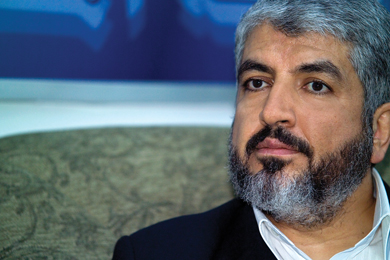
Nelson Mandela famously said, ‘The struggle is my life,’
and for many people that sums up the heroism of the man. It occurs
to me that if he had been speaking Arabic, he would have used the
word jihad. Can you explain what jihad means to
Hamas, and in particular to you?
I would like first to explain how the people of this region feel
and think, because the distorted stereotype of Palestinians, or
Muslims, or Hamas, that is presented in the West prevents you from
seeing the reality. We have two states of mind that go together:
they may seem contradictory but they complement each other, and
both are very human. One is a state of compassion and love towards
people who are not hostile or aggressive towards us – to all
people, including the poor and those of a different religion or
race. The other is of strength and steadfastness, courage and
defiance in facing those that attack us. This is part of what it
means to be human – a normal person is obdurate towards those who
are hostile and merciful towards those who live peacefully.
This is where the concept of struggle, of jihad, of
resistance comes in. This is not our attitude to everyone; we
engage in struggle, jihad, resistance against the enemy
who steals our land and destroys our houses, commits sacrilegious
acts against our holy places, assaults children and women and kills
people. It is our normal, natural right to resist, to struggle
against them. All the laws given by God, (2) and international law,
give us this right. So, jihad is a response to aggression;
it does not itself initiate aggression.
Sometimes in Islamic culture the term jihad is applied
to any exertion aimed at achieving good, in resisting the devil, in
resisting evil desires, in resisting the enemy that attacks the
land. It should not be directed at peaceful peoples – such
aggression is not permitted in Islam. Islam does not permit the use
of force to resolve political disputes within society, or between
societies; but when someone uses force against you, you use force
to resist them. There is no ambiguity about this.
Your enemies try to bracket Hamas with al-Qa’eda and say
you are all the same. Can you clarify whether you see what
al-Qa’eda does as jihad, and do you welcome it when Osama
bin Laden expresses support for the Palestinians?
I don’t want to talk about others, but if anyone is in doubt
about Hamas, they need only ask the questions: Has Hamas ever
fought outside Palestine? And has it ever resisted anyone other
than the Israeli occupation? Any fair-minded person will see the
difference.
In March this year, after Israel’s operation ‘Hot
Winter’ had killed scores of people in the Gaza Strip, al-Aqsa TV
reported: ‘Mr Mish’al expresses his wish to be in Gaza at this
tense and painful moment, noting that he also wishes his four sons
could be there and fight … and be martyred just like the other
Palestinians.’ I think that people in the West can
understand you wanting your sons to fight, but wanting them to die
is something we can’t understand and it makes you seem inhuman to
us. Can you explain this mentality to us?
First of all, I must set an example to others and commit myself
and my family to the same principle I call others to follow. This
is the duty of a leader. He should not sacrifice others while he
does not sacrifice himself and his children. Also, if I was living
in Palestine, my children would naturally be fighting, like all the
children of our people. But I don’t require them to do so. I
encourage them, but I don’t make them. Jihad is a choice,
not an obligation to be imposed on someone.
The third thing is that the Palestinians, like Nelson Mandela,
feel that their life is struggle and resistance. When you live
every day under occupation, your natural behaviour – This is what
people in the West should understand: every day, we suffer
aggression, killing and siege, with houses destroyed and families
homeless. We have 11,600 people held in Israeli prisons, some of
them children and women, some of them elderly – a thousand of them
sick. When someone sees his life destroyed and sees that the world
cannot help – We see that the United Nations can do nothing. There
is no international will to force the Israelis to leave our land as
it forced Saddam Hussein to leave Kuwait.
In these circumstances, you are obliged to resist if you want to
live with dignity. If you don’t, you’re not behaving normally. It’s
just like if a person is sitting at home and suddenly a fire breaks
out in the house. The natural response is to get some water and
pour it on the fire. When you live in an occupied land, it’s
natural to take up arms to resist.
And this becomes a matter of pride for a dignified person. You
feel proud that you are doing your duty, just like a person who
puts a fire out – or when someone goes to rescue someone who is
drowning, it is his duty but he feels proud to be doing it. So, you
find that Palestinians are proud of their struggle even though it
is forced upon them. We feel that this is what it means to be a
man, this is what it means to do the right thing.
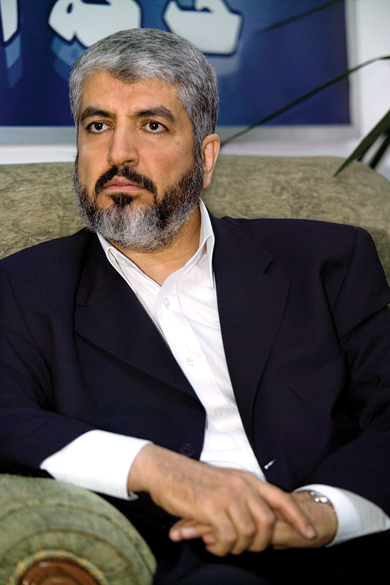
When Third Way interviewed Sheikh Yusuf
al-Qaradawi, (3) he told us: ‘The enemies of the Palestinians are
more interested in life than in sacrifice.’ Does that mean that you
are more interested in sacrifice than in life?
This is surely a rather sophisticated concept that needs
clarification. We, like all human beings, love life, but we love
life with dignity. We do not like to live in humiliation, under
oppression. Perhaps – and this is what the sheikh probably means –
there are people who do not care how they live, they want just to
live – even if it is in humiliation. People in this region – Arabs
in general, and Muslims – do not want to live like that.
But when we say, as Palestinians, as Arabs, as Muslims, that in
order to free our people from injustice and occupation we are ready
to die, we say this not because we hate life, no, but because we
want to die so that the rest of our people can live in freedom and
dignity. It is a matter of some people sacrificing themselves so
that the rest of the people may live. It is because we have a
responsibility – not a hatred of life, or a death wish.
When Mossad tried to assassinate you in 1997, (4) how
did that affect you? Did it change your outlook on
life?
It did not change my course, but it made me more positive about
life. I became more courageous in the face of death. My faith
became stronger that a man does not die until his time comes. That
is, I will die when God decides, not when Mossad decides. It also
made me more resolute in fulfilling my responsibilities.
In our experience, Israeli threats have one of two effects: some
people are intimidated, but others become more defiant and
determined. I am one of the latter.
We have talked to other people involved in conflict, and
some have said, ‘There is no peace without justice’ and others,
‘There is no peace without compromise.’ Can you have compromise
and justice, or do you have to choose?
You may find my answer surprising, but in our case the Israelis
refuse both. They want neither a peace based on justice nor a peace
based on compromise. They want to keep the land, they want security
for themselves and they want to be the masters of the whole region,
without recognising the rights of Palestinians. Yasser Arafat and
Mahmoud Abbas tried to pursue a compromise. Did they achieve peace
with the Israelis? So, the obstacle to peace in the region is
Israel – and American bias.
Hamas has shown a strong commitment to democracy. You
were elected yourself; the cabinet was elected by your members in
2006; and in his first speech as prime minister Ismail Haniya told
the Palestinian parliament: ‘Hamas will adhere to the democratic
choice, protecting Palestinian democracy and the peaceful rotation
of power.’
Are you really such enthusiasts for democracy? Isn’t it
essentially a Western idea, and isn’t Hamas opposed to the
westernisation of Palestinian society?
‘Democracy’ may be a Western term, but as a conception of how to
order the political life of a society, there are many Islamic
elements in it. We practise a version that may differ from Western
democracy in some details, but the essential principles of freedom,
choice and the rejection of despotism – these are all Islamic
concepts.
In Hamas, no one becomes a leader without being elected, and all
are accountable. I practise democracy daily inside the movement,
and it is natural to practise it in Palestinian society.
Also, I would like to add that I don’t have a problem with
making use of a Western idea if it is good.
Isn’t there a tension, though, between democracy and
true religion? Democracy requires you to do what the majority of
the people want, but religion tells you that very often what most
people want is not God’s will.
A good question! Look, in any country democracy is always a
product of the social, cultural, historical and religious
environment. So, we are not afraid of democracy – but we fear it
when it is imposed on us, or dictated to us, with a foreign agenda.
If the Arab and Muslim societies in the region are allowed to make
free choices without pressure or influence, we in Hamas do not fear
their choices, we respect them. The important thing is that there
is no interference from America or others.
And you must understand that even piety is a choice, not an
obligation you impose. You cannot compel people to be devout – you
can compel them to submit, but not to have faith.
Another principle of democracy, as far as the West is
concerned, is that everyone is of equal value, and so are their
interests and even, in a sense, their opinions. Many people in the
West have the impression that Islam does not set the same value on
women and their interests and opinions as on men and theirs.
Likewise, it makes distinctions between Muslims and non-Muslims. Is
that a misunderstanding of Islam – or is it a problem between your
faith and your commitment to democracy?
Look, there has been a misrepresentation of Islamic thinking on
these issues. In Islamic culture, all human beings are equal in
value. What God has said is: ‘The more honoured in the eyes of God
are those who are more pious.’ (5) Between men and women there is a
general equality, in terms of rights and duties, the right to own
property, the right to be religious, the right to choose and so
on.
But there are differences, because of the difference in
nature between men and women. This is natural. Even the West
observes this. Let me give you an example from sport. Do you have
in the West a boxing match between a man and a woman? Or a game of
tennis? Why not? Because in the West you recognise that there are
differences in strength and ability. Men and women have the same
right to do the sport, and so in a sport such as athletics there
are records for men and records for women – because there are
differences between them.
When it comes to Muslims and non-Muslims in our societies, we
share our homeland in spite of our difference in religion. We did
not have a problem with Christian minorities in our countries, or
with Jewish minorities. The Jewish ‘problem’ arose in Europe. So,
your understanding of Islamic culture is not right. There may be
some extremism among some individuals and groups, but then
extremism exists in both the East and the West.
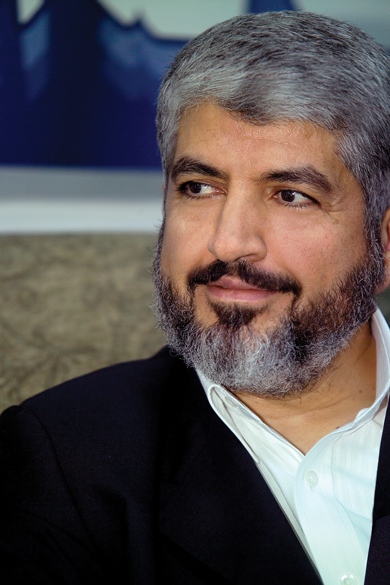
If Hamas accepts the will of the majority, why before
2006 did you not accept the decision of the elected Palestinian
Authority and give up the armed struggle?
Who said that [the] Oslo [Agreement] reflected the Palestinian
will?
But in 1996 the PA was voted into power by the majority
of the Palestinian people.
You need to distinguish between two things. When the Authority
was elected [in 1996], we did not take up arms against them or
stage a coup against them, even though they persecuted us and
detained us and did illegal and unethical things to us. But when
the Authority was first established in 1994, as a result of Oslo in
1993, how was it regarded by the Palestinian people? It was not
endorsed democratically. There was no referendum. In Europe, when a
state is about to join the European Union or the euro zone, you
hold a referendum. We respect that. I can confirm that if the
majority of Palestinians, inside and outside Palestine, made a
choice in an honest, democratic way, we would respect it.
You have said many times that Hamas has ‘a high degree
of pragmatism’. Do you find there is any tension between your
principles as a devout and God-fearing man and the compromises that
practical politics demands? Or do they come easily to
you?
A good question, and I have an answer for you. I believe that
pragmatism – or flexibility, in other words – is a necessity; but
there is a difference between flexibility that knows no
restrictions and flexibility within certain bounds and a certain
philosophy. In life, if you want to be inflexible and live without
give-and-take, you have to live alone. As a Muslim, I do not have a
problem in being true to my values while practising flexibility in
my life, both as a person and as a politician. Even in Islam, there
is flexibility in our religious practice, and allowances – in
prayer, in pilgrimage, in fasting and so on. The most important
thing is to be committed.
It is possible when dealing with other people to find solutions
that do not contradict your commitments, and in Hamas we do not
feel that this is a problem. The only problem is when a particular
degree or form of pragmatism is imposed on us by the will of our
enemies or by foreign interference.
Surely some Muslim commitments are inflexible? For
example, it is said that Palestine is a waqf and no inch
of its land can be given up because it is an endowment for all
Muslims until the Day of Judgement. Some people may see that as an
extreme position, but from any angle it looks like a non-negotiable
one.
I appreciate that it’s pointless for me to ask you
anything that is properly a matter for the final negotiations,
whenever they come, between you and Israel; but can you say what
principles will determine the compromises Hamas can
make?
Look, the concept of waqf may be difficult to explain
in an interview like this, because it relates historically to how
Muslims dealt with this land when Islam arrived here in its early
days.
Let me talk instead about a concept that should not be unclear
or unintelligible to any society in the world today: the concept
that peoples have homelands. So, the British have a homeland, the
Americans have a homeland, the French, the Chinese, the South
Africans… And how does a person act towards his homeland? If
someone who was born, 60 or 70 years ago, in Liverpool or
Manchester or London insists on his claim to that city, is that
abnormal?
Nonetheless, we in Hamas, like most of the Palestinian factions,
have accepted the idea of a state with the borders of June 4, 1967.
(6) However, we have said that we will not recognise Israel. Why?
Because the Palestinian people are convinced that this land on
which Israel exists is their own land. So, while they accept a
state with the borders of 1967, they do not want to give legitimacy
to those who occupied their lands 60 or 70 years ago. So, the
formula is simply this: if through politics we have accepted a
state with the borders of 1967, why should we be forced to renounce
our beliefs and feelings and recognise Israel?
You have talked passionately about the importance of a
homeland. Do you accept that the Jews are entitled to a homeland of
their own?
But why should the Jews have a homeland of their own? Would you
expect the Christians or the Muslims to have an exclusive homeland
of their own? We Muslims never think of the Jews as a nation – to
us, they are a religious community. The Jews lived alongside
Muslims and Christians for many centuries, and can continue to do
so if they wish to – but definitely not as a Zionist state forced
upon us.
If Israel is the state for the Jews, how is it that many
millions of Jews – nearly two-thirds of the Jews in the world –
continue to live as citizens of other countries around the world?
How is it, too, that you find so many Jews who are opposed to
Zionism and the Zionist state?
Finally, if the West insists, out of a desire to atone for the
sin of the Holocaust, that the Jews must have a country for
themselves, let those who persecuted them and perpetrated the
Holocaust against them give them a slice of their own country, not
ours!
Many Christians in the West are afraid of Islam. Can you
tell me honestly what you think of Christianity?
My answer is not a diplomatic answer: it comes from my heart and
from my mind. Many people in the West do an injustice to Islam and
make false accusations against it, because they misunderstand it or
because they see some Muslims behaving badly and they generalise,
or because they want to justify aggression, as George [W.] Bush
did.
Look today, who is occupying whose lands? The Zionists are
occupying Palestine. Should I conclude that Judaism is an
aggressive religion? Judaism is a religion revealed by God – we
believe in Moses. It is not Judaism that is to blame, but those who
claim to adhere to it and wrongfully occupy other people’s land in
its name.
Who is occupying Iraq and Afghanistan? America. Would it be
right for me to conclude that Christianity is an aggressive
religion? We believe in Christ. A Muslim is not a full believer
unless he believes in Moses, Jesus and Muhammad and all the
prophets. We respect all revealed religions. The problem lies with
those who adhere to – some of those who adhere to – Christianity
and in its name, as George Bush does, attack others.
We are not afraid of Judaism or Christianity as religions. We
are – I wouldn’t say ‘afraid’, but we are opposed to all who commit
aggression, whether it is under the banner of religion or under a
secular banner.
Do you have any personal friends who are
Christians?
Of course. Of course.
Do you have any personal friends who are
Jews?
No, I don’t have any Jewish friends, because I haven’t lived in
the West and I’ve never lived in an area where there were Jewish
people.
I will tell you a meaningful story. A few months ago, I was
passing through one of the Arab airports. I was just like any other
passenger, among the people. Many people came to me to greet me,
shake hands with me and hug me. They expressed their love and
appreciation. There were among them those who were religious and
those who were not. One of them shook hands with me warmly and
introduced himself, and said he was from a town called Beit Jala in
the West Bank, which is known as a Christian town in Palestine. He
told me that he was Christian and that he voted for Hamas, and
said: ‘We are with Hamas and we support Hamas.’ This is commonplace
in Palestine. Christians in Palestine support Hamas, and we have
good relations with the Christians in Palestine. As you may be
aware, one of our candidates in Gaza in 2006 was Kamal Taweel, who
is a Christian.
And, also, from now on you are my friend.
Here is a short question –
Your questions are short but they raise big issues.
George Bush has called the conflict in the Middle East a
battle between good and evil. Is that how you see it?
Yes – but the other way round.
This does not apply to Palestine only. Any people that is
invaded and occupied represents good and the invaders and occupiers
represent evil, whoever they are.
Much of the conflict over the Middle East is fought with
words, and perhaps the most powerful verbal weapon in your enemies’
arsenal is the word ‘terrorism’. It’s a word that can do a huge
amount of damage, but you could say it is rather indiscriminate,
because no one agrees what it means. I’d like to know what you
understand by it.
First of all, we in Hamas – and Palestinians in general – do not
submit to American terminology. There is something we call ‘the
terrorism of terminology’ – and this word is used by America to
impose its will on the world.
Put simply, terrorism is the unjust use of force or intimidation
in order to oppress other people. This is – I do not say the
Palestinian or the Arab definition of the term, it is the original,
human definition. On that basis, America is the premier terrorist
power in the world.
When you resist aggression or occupation, that is not terrorism.
It is legitimate self-defence.
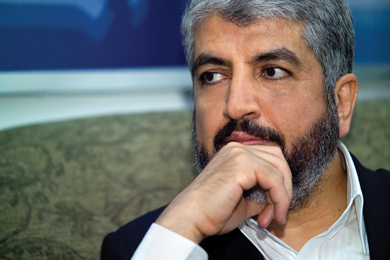
When we questioned Sheikh al-Qaradawi about suicide
bombing, he said that ‘it is part of the justice of God that some
people have a readiness to sacrifice themselves that their enemies
do not possess.’ Some people would say that this
weapon has done more damage to the Palestinians than to Israel. For
example, the reason why so many people in the West condone the wall
the Israelis are building on Palestinian land is that they accept
the Israeli argument that it is legitimate self-defence against
suicide bombers.
Look, given the imbalance of power and the lack of weapons and
support to match those of the occupiers, the Palestinian, as Sheikh
Qaradawi said, feels compelled to turn himself into a human bomb as
a kind of expression of resistance. Historically, martyrdom
bombings came as a response to massacres, especially the massacre
at the Ibrahimi Mosque in Hebron, where [Baruch] Goldstein killed
29 people who were praying and injured scores of others. (7) So,
these operations were a natural response to the massacre of
civilians, of people who were worshipping God.
As for their effectiveness, dear brother, any action in the
world has both positive and negative results. We recognise that
these operations have a negative impact, especially in terms of
world public opinion, and we know that Israel takes advantage of
them to justify its aggression; but the basic effect of these
operations has been twofold. First, they have shaken the validity
of the theory of Israeli security – and you know how important
security is to the life of Israel. This is something that some
people try to conceal.
And, second, what is the message that these operations deliver?
The most important message is that the Palestinian people will
never capitulate. If they do not find weapons, they will fight with
their bodies. And this, I assure you, is what is going to cut the
conflict short. This will compel Israel to recognise Palestinian
rights.
Can you foresee a day when Muslims, Jews and Christians
will live together in harmony between the Jordan and the sea? What
will have to happen to make it possible?
That was the case in the past, and it can be so again in the
future. What matters is that occupation and aggression come to an
end, and the Zionist ambitions on which the Zionist movement was
based. If a Muslim comes to attack me and oppress me and take away
my home and my rights, I will fight him, and the same applies to
Christians and Jews. We do not resist Israelis because they are
Jewish, we fight them because they are occupiers.
I believe that the Qur’an, like the Jewish Bible,
suggests that sometimes it is legitimate, and even proper, to hate
other people. (8) Can I ask you: Do you hate the
Israelis?
No, hatred is not mentioned in the Qur’an. You judge actions,
not people, and when someone changes his behaviour, you change the
way you deal with him. For me myself, as for everyone in Palestine,
our hatred is for the crimes the Israelis commit against us.
In our Islamic culture, whether your neighbour is a Muslim or a
Christian or a Jew, you have to treat him well, and he has a right
that we call ‘the right of the neighbour’. In such a culture,
Muslims and Christians and Jews in this region lived without
conflict. Do not forget that Palestine is the land of messengers
and messages from heaven! It has always had a genuine culture of
tolerance.
Nevertheless, it is a general human observation that
conflicts such as this one, even when they are over, leave a legacy
of hatred – and often it is religious people who have done the most
to deal with it. Are there concepts in Islam that will help to
restore harmony in the Middle East once a political resolution has
been reached?
Of course. Islam has many different remedies for hatred and
conflict between people. First, it reminds people that they are
children of Adam and Eve and so they are brothers and sisters in
humanity. Second, it has regulations to prevent aggression and the
theft of other people’s property – the behaviour that leads to
hatred. Islam has rules to punish oppressors and aggressors,
because when people who have been oppressed feel that the law
upholds their rights, they feel comfortable and do not cherish
hatred. It is when people feel they have been oppressed and no one
has given them justice that hatred thrives. Punishing the
oppressors is a cure for the hatred of the oppressed.
Islam sets a notable example – in two ways. The first way is
justice, where you take what is due to you from the oppressor. But
then there is another way, which is forgiveness: you forgive the
oppressor in the hope that God will reward you. For example, if
someone hits you, you can hit him back or you can forgive him in
pursuit of God’s reward. However, this applies only at the
individual level, not at the level of peoples and societies.
Whenever verses in the Qur’an state a rule, they usually end by
reminding us of God and the Day of Judgement. When you feel that
you have a Lord who will give you justice and a day will come when
God will reward you, you do not become preoccupied with your
problem. This is the teaching of the Qur’an, but I believe that in
essence all the revealed religions have the same spirit, though the
rules are different.
What one thing could Israel do to persuade you that it
was serious about making peace?
Withdraw – as all the Palestinian factions have demanded – to
the borders of June 4 [1967], dismantle the settlements and
recognise the Palestinians’ rights, including Jerusalem and the
right of return [for the refugees of 1948]. The alternative is for
Israel to continue on the path to escalation – and Israel will be
the first side to lose as a result.
I understand that there is a list of demands, but if
peace is to come, it is going to be a process. What I am asking is:
What could Israel start to do now that would persuade you that it
is changing?
I learnt in physics that there is something called ‘the
threshold’. Within the atom, for an electron to move to another
orbit –
I think we call it a ‘quantum leap’.
Yes. Sometimes when that threshold is crossed, it leads to big
changes. Sometimes it leads to a new power, a new state – both in
matter and in human life. The start that is needed from Israel is
to admit that it has wronged the Palestinian people, oppressed them
and taken their land, and consequently to recognise their
rights.
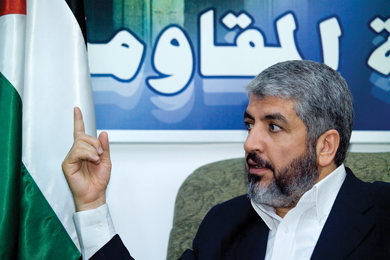
When Third Way talked to Gerry Adams in 1996,
he came across as so earnest and reasonable, we felt we needed to
title the interview ‘Is He Sincere?’ There are people in the West
who say that you are very moderate when you talk to our media, but
when you talk to your own people it’s a different matter. How do
our readers know that what you have said to me today is
sincere?
When I talk to Palestinian or Arab audiences, there are usually
foreign journalists present. So, my language is the same, whether I
am addressing Arabs or foreigners. A simple example: when I talk to
the West, I say that we accept a state with the borders of 1967,
and before my people I say that we accept a state with the borders
of 1967 (with the qualifications that everyone knows, of course).
Our discourse is the same – we are not afraid of the truth. When we
are persuaded of something, we have the courage to declare our
conviction in front of our people and in front of others.
One of the virtues of this movement is that it has taken some
difficult steps, and though perhaps some other Palestinian factions
objected to them, it was convinced about them and about their
importance. Take the ‘calming’, or truce, for example. Hamas took
this initiative many times. We did not have a dual discourse,
talking of escalation when we spoke to our people and when we saw
foreigners saying we want a truce.
Hamas is not a small movement that is not called to account for
what it says. We are a big movement that faces the consequences of
what we say and so we think carefully about what we say. Here is a
practical example: if Hamas wanted to be duplicitous with the West,
God forbid, we would not have been so candid in refusing to
recognise Israel. So, our position is clear whether we are
addressing the region or addressing the West.
—
1 The Catastrophe – the events of 1948, when the state of Israel
was established on Arab soil
2 That is, in the Bible and the Qur’an
3 ‘Sage Green’, Third Way, September 2004
4 On September 25, 1997, two Israeli agents attempted to kill him
in the street outside his office in Amman by spraying poison into
his ear. He survived after King Hussein and President Bill Clinton
insisted that Israel provide the antidote.
5 Sura 49:13
6 That is, before Israel took the West Bank and Gaza Strip in the
Six-Day War
7 On February 25, 1994. The first Hamas suicide bombing took place
40 days later.
8 Sura 60:4; Psalm 139:21
—
This interview was conducted on May 21, 2008 at Khalid
Mish’al’s house in Damascus. The interpreter was Dr Azzam Tamimi,
director of the London-based Institute of Islamic Political Thought
and author of Hamas: A history from within.
Translation by Ahmad alMuhammad, with thanks to Amjad
Taha